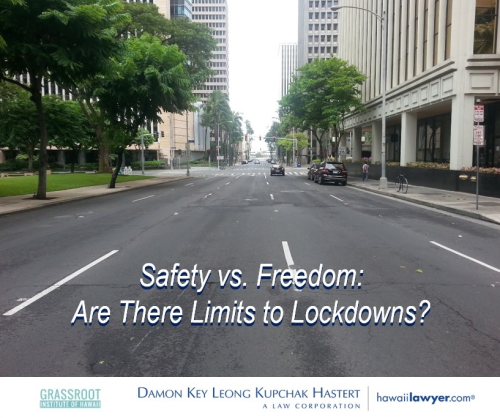To all who joined from Hawaii and across the nation, thank you for doing so. As I mentioned during the webinar, here is the video and links to the cases and other materials I spoke about:
- “Emergency does not create power. Emergency does not increase granted power or remove or diminish the restrictions imposed upon the power granted or reserved.” Home Building & Loan Assoc. v. Blaisdell, 290 U.S. 398 (1934).
- The King v. Tong Lee: Hawaii Supreme Court upholds restrictions on commercial laundries in Honolulu’s Chinatown deferring to the government’s assertion that doing so was necessary to preserve the public health.
- United States v. Pac. R.R., 120 U.S. 227 (1887): during the Civil War, the Union Army blew up railroad bridges “to prevent the advance of the enemy.” No compensation because the destruction of the bridges was a “military necessity.” “The destruction or injury of private property in battle, or in the bombardment of cities and towns, and in many other ways in the war, had to be borne by the sufferers alone as one of its consequences.”
- Miller v. Schoene, 276 U.S. 272 (1929): the state ordering the destruction without compensation of otherwise un-threatened cedar trees because they served as a “host plant” to a disease harmful to nearby apple trees is a valid exercise of the government’s police power. Courts should not question too hard the government’s assertion that the action was needed.
- The legal fallout from past public health disasters.
- The Steel Seizure Case (Youngstown Sheet and Tube Co. v. Sawyer, 343 U.S. 579 (1952)). The President’s order to seize steel mills during the Korean War to prevent a strike is limited by the Constitution. The executive’s power even during emergencies is limited by the legislature’s authority.
- Armstrong v. United States, 364 U.S. 40 (1960). The case that gave rise to the famous quote about the cost-distribution purpose of the Just Compensation Clause: “The Fifth Amendment’s guarantee that private property shall not be taken for a public use without just compensation was designed to bar Government from forcing some people alone to bear public burdens which, in all fairness and justice, should be borne by the public as a whole.” The feds had rendered invalid state law materielmen’s liens on boats being built for the federal government. Held: compensation required.
- Government must provide compensation for commandeering property during an emergency.
- Same if the government takes over your business.
- SPAM: Every Hawaii resident’s Plan B.
If you had a question that we could not get to during the session, please email me.
